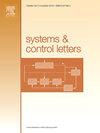Near optimality of Lipschitz and smooth policies in controlled diffusions
IF 2.1
3区 计算机科学
Q3 AUTOMATION & CONTROL SYSTEMS
引用次数: 0
Abstract
For optimal control of diffusions under several criteria, due to computational or analytical reasons, many studies have a apriori assumed control policies to be Lipschitz or smooth, often with no rigorous analysis on whether this restriction entails loss. While optimality of Markov/stationary Markov policies for expected finite horizon/infinite horizon (discounted/ergodic) cost and cost-up-to-exit time optimal control problems can be established under certain technical conditions, an optimal solution is typically only measurable in the state (and time, if the horizon is finite) with no apriori additional structural properties. In this paper, building on our recent work (Pradhan and Yüksel, 2024) establishing the regularity of optimal cost on the space of control policies under the Borkar control topology for a general class of controlled diffusions in , we establish near optimality of smooth or Lipschitz continuous policies for optimal control under expected finite horizon, infinite horizon discounted, infinite horizon average, and up-to-exit time cost criteria. Under mild assumptions, we first show that smooth/Lipschitz continuous policies are dense in the space of Markov/stationary Markov policies under the Borkar topology. Then utilizing the continuity of optimal costs as a function of policies on the space of Markov/stationary policies under the Borkar topology, we establish that optimal policies can be approximated by smooth/Lipschitz continuous policies with arbitrary precision. While our results are extensions of our recent work, the practical significance of an explicit statement and accessible presentation dedicated to Lipschitz and smooth policies, given their prominence in the literature, motivates our current paper.
受控扩散中的利普切茨和平稳政策的近最优性
对于若干标准下的扩散最优控制,由于计算或分析方面的原因,许多研究都先验地假定控制策略是立普齐兹或平滑的,但往往没有严格分析这种限制是否会带来损失。虽然在某些技术条件下,可以建立马尔可夫/稳态马尔可夫政策对预期有限视界/无限视界(贴现/迭代)成本和成本-退出时间最优控制问题的最优性,但最优解通常只在状态(和时间,如果视界是有限的)上可测量,而没有先验的附加结构特性。在本文中,我们在近期工作(Pradhan and Yüksel, 2024)的基础上,针对 Rd 中的一类受控扩散,建立了 Borkar 控制拓扑下控制策略空间上最优成本的正则性,并在预期有限视界、无限视界贴现、无限视界平均和直至退出时间成本准则下,为最优控制建立了平滑或 Lipschitz 连续策略的近似最优性。在温和的假设条件下,我们首先证明在博尔卡拓扑下,平滑/利普斯奇兹连续政策在马尔可夫/静态马尔可夫政策空间中是密集的。然后,利用博尔卡拓扑结构下马尔可夫/稳态政策空间中最优成本作为政策函数的连续性,我们确定最优政策可以用任意精度的平滑/边缘连续政策近似。虽然我们的结果是对我们近期工作的扩展,但鉴于利普斯基茨和平稳政策在文献中的突出地位,对它们进行明确的陈述和易懂的介绍对我们当前的论文具有实际意义。
本文章由计算机程序翻译,如有差异,请以英文原文为准。
求助全文
约1分钟内获得全文
求助全文
来源期刊

Systems & Control Letters
工程技术-运筹学与管理科学
CiteScore
4.60
自引率
3.80%
发文量
144
审稿时长
6 months
期刊介绍:
Founded in 1981 by two of the pre-eminent control theorists, Roger Brockett and Jan Willems, Systems & Control Letters is one of the leading journals in the field of control theory. The aim of the journal is to allow dissemination of relatively concise but highly original contributions whose high initial quality enables a relatively rapid review process. All aspects of the fields of systems and control are covered, especially mathematically-oriented and theoretical papers that have a clear relevance to engineering, physical and biological sciences, and even economics. Application-oriented papers with sophisticated and rigorous mathematical elements are also welcome.
 求助内容:
求助内容: 应助结果提醒方式:
应助结果提醒方式:


